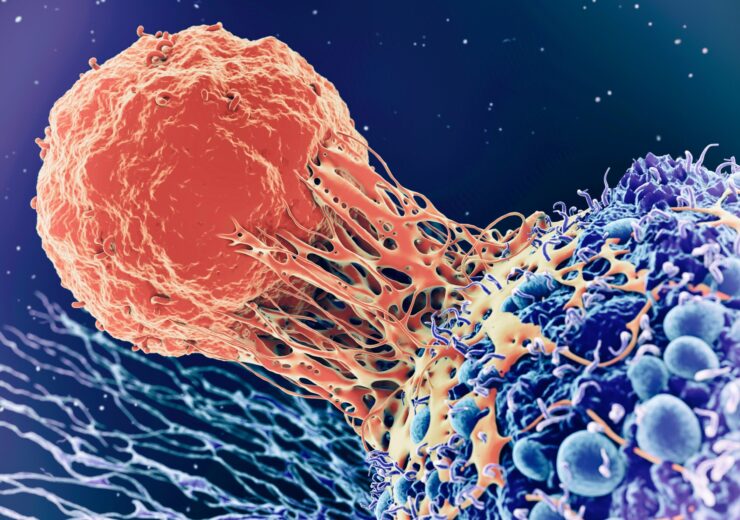According to the medical technology company, the trial is expected to use F-CD8 targeted imaging radiopharmaceutical to detect CD8+ T cells in the tumour of the patient and its response to immune checkpoint inhibitors

A representation of a T cell (orange) interacting with a cancer cell (blue) (Credit: Business Wire/ GE HealthCare)
US-based GE HealthCare has scanned the first patient in the Phase 1 clinical trial of investigational fluorine-18 (F-CD8) Positron Emission Tomography (PET) radiopharmaceutical specific for CD8, which is expressed on CD8+ T cells.
According to the company, the trial is expected to use F-CD8 targeted imaging radiopharmaceutical to detect CD8+ T cells in the tumour of the patient and its response to immune checkpoint inhibitors.
The study will also identify early responses to immunotherapies leveraging sequential whole-body imaging to track CD8 changes over a period, allowing physicians to switch patients who show no response to other treatment options sooner, GE HealthCare said.
The clinical study, which was started in the Netherlands, examines the 18F-labeled radiopharmaceutical’s safety and tolerability in patients with solid tumour malignancies.
It will also decide the best time to perform a patient scan after administering F-CD8 PET radiopharmaceutical by reducing the need for additional visits, thus increasing the patient’s convenience.
In comparison to months with the traditional RECIST (response evaluation criteria in solid tumours) approaches, the radiopharmaceutical can allow sequential imaging for capturing even modest spatial and temporal changes in CD8+ T cells in two to four days after an initial dose of immunotherapy or combinations of agents.
The medical technology firm said that immune checkpoint drugs often only work in 20–40% of patients. If this tracer is successful, it may be used to select patients who are more likely to respond to the right treatment.
GE HealthCare Pharmaceutical Diagnostics segment Global Research & Development head Paul Evans said: “Immunotherapies can transform patients’ lives but low response rates, the potential of serious adverse effects, and high costs present challenges.
“That’s why research in this area is so important, to help individualise diagnosis and treatment for each patient.
“We will continue to innovate in this space, working alongside pharmaceutical companies and the oncology research community to develop a new class of complementary and companion imaging diagnostics.”
